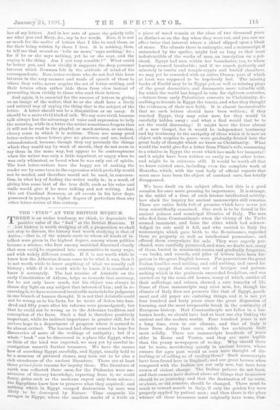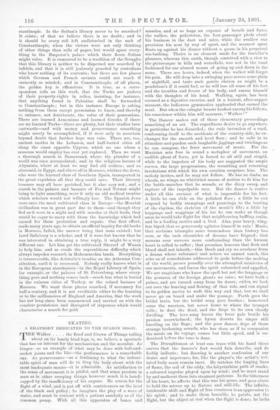THE " FIND " AT THE BRITISH MU5EUM.
THERE is an undue tendency, we think, to depreciate the positive value of the " find " at the British Museum. If _lent history is worth studying at all, a proposition we shall not stop to discuss, the history best worth studying is that of Attica,—that is, of the minute caste to whom all kinds of in- tellect were given in the highest degree, among whom polities became a science, who first among mankind discerned clearly that men could, be organised into communities in many ways, and with widely different results. If it is not worth while to know bow the Athenian demos came to be what it was, then it is not worth while to know anything of what we usually call history ; while if it is worth while to know, it'is essential to know it accurately. The lost treatise of Aristotle on the early Constitution of Athens, helps us towards that accuracy, for he not only knew much, but his object was always to throw dry light on any subject that interested him; and in re- covering it, we have recovered invaluable materials for judgment in one branch of human thought. It is not that Aristotle could not be wrong as to his facts, for he wrote of Solon two hun- dred and fifty years after his reforms wore promulgated ; but that he could not be wrong as to the Athenian tradition and conception of the facts. Such a find is therefore positively important, while its indirect importance is greater still, for it revives hope in a department of progress where it seemed to be almost extinct. The learned had almost ceased to hope for discoveries of more of the writings of antiquity ; but if a whole " book" can be discovered in a place like Egypt, where so little of the kind was expected, we may yet by careful in- vestigation unearth further treasures. We have the means 'bow of searching Egypt carefully, and Egypt, usually held to be a museum of pictured stones, may turn out to be also a rich storehouse of the ancient literature. ' There are at least three prima-facie reasons for inquiry there. The literature of earth was collected, there once, for the Ptolemies were om- nivorous of literary knowledge, expecting from it, we could fancy, gains such as the moderns expect only from science ; the Egyptians knew how to preserve what they acquired; and nothing which in Egypt escaped destruction by man was likely to be destroyed by Nature. Time suspends his ravages in Egypt, where the smallest marks of a knife on
a piece of wood remain at the close of two thousand years as distinct as on the day when they were cut, and you can see after twice that interval where a chisel slipped upon a block of stone. The climate there is antiseptic, and a manuscript, if untouched by the spoiler, might last as long as that most indestructible of the works of man, an inscription on a pot- sherd, Egypt had men within her boundaries, too, to whom learning seemed invaluable ; and if we search patiently and minutely in tombs and temple-crypts and buried chambers, we may yet be rewarded with an entire library, part of which at least was supposed to be hopelessly lost. The missing books of Euclid may be in Egypt yet, as well as missing plays of the great dramatists, and documents more valuable still, for which the world has longed in vain for eighteen centuries, —letters from early Palestinian converts to Christianity, de- scribing to friends in Egypt the tenets, and what they thought the evidences, of their new faith. It is almost inconceivable that no such letters should have been written ; if they reached Egypt, they may exist now, for they would be carefully hidden away ; and what a find would that be to set the world discussing ! It might have the force almost of a new Gospel, for it would be independent testimony and lay testimony to the antiquity of ideas which it is now an object with sceptics to prove were gradually foisted into the great body of thought which we know as Christianity. What would the world give for a letter from Pilate's wife, recounting to a relative in Egypt the event which has made her immortal ! and it might have been written as easily as any other letter, and might be in existence still. It would be worth all that we know existed once, including even the complete work of Manetho, which, with the vast body of official reports that must once have been the object of constant care, has totally disappeared.
We have dwelt on the subject often, but this is a good occasion for once more pressing its importance. It is strange, in the midst of a time of such intense intellectual activity, how slack the inquiry for ancient manuscripts still remains. There are entire fields full of promise which have never yet been scientifically examined. One such is to be found in the ancient palaces and municipal libraries of Italy. The men who fled from Constantinople when the victory of the Turks seemed imminent, and from the cities which had acknow- ledged its rule until it fell, and who carried to Italy the manuscripts which gave birth to the Renaissance, regarded them as property as well as intellectual possessions, and offered them everywhere for sale. They were eagerly pur- chased, were carefully preserved, and were, we doubt not, many of them, buried in muniment-rooms and gradually forgotten, —as books, and records, and piles of letters have been for- gotten in the great English houses. For generations the great Italian families read nothing, and sold nothing, and eared for nothing except that eternal war of intrigue and patron- seeking which in the peninsula succeeded feudalism, and was carried on by the same old houses, many of which, amidst all their sufferings and crimes, showed a rare tenacity of life. Some of these manuscripts may exist now, for, though the climate of Italy does not preserve like that of Egypt, parch- ment and old paper are enduring things, and it is not yet four hundred and forty years since the great dispersion of learning, and the most irreparable break in the continuity of European history. Had Constantinople not fallen to a bar- barian horde, we should have had at least one city linking the ancient and the modern worlds. Four hundred years is not a long time, even in our climate, and that of Italy is freer from damp than ours, while her architects built more solidly. There are manuscripts hundreds of years older in Rome and Venice, and they are more legible than the penny newspapers of to-day. Why should there not be more, mouldering quietly in ancient houses, whose owners for ages past would as soon have thought of dis- turbing or of selling as of reading them ? Such manuscripts have been found here in England; and our great houses, when compared with the Italian, are not only new, but have been scenes of violent change. The Italian palaces do not burn, and their owners have desired above all things that to-morrow should be as yesterday, and that the destination of no room, or closet, or old armoire, should be changed. There must be much to reward search in Italy, if only the golden key were properly applied by patient men ; and then there is the place whence all these treasures must originally have come, Con-
stantinople. Is the Sultan's library never to be searched It exists ; of that we believe there is no doubt; and in it should be every roll left undisturbed in the sack of Constantinople, when the victors were not only thinking of other things than rolls of paper, but would spare every- thing in the Emperor's palace which their fierce Sultan might value. It is rumoured to be a tradition of the Seraglio that this library is neither to be dispersed nor searched by infidels, and that it is still jealously guarded by custodians who know nothing of its contents; but there are few places which German and French savants could not reach if earnestly so minded; and in Constantinople, of all places, the golden key is efficacious. It is true, as a corre- spondent tells us this week, that the Turks are jealous of their property-rights in relics, insisting, for instance, that anything found in Palestine shall be forwarded to Constantinople ; but in this instance Europe is asking nothing from them except permission to know, and thereby to enhance, not deteriorate, the value of their possessions. There are learned Armenians and learned Greeks, if there are no learned Turks—there are plenty, but their studies turn eastwards—and with money and perseverance something might surely be accomplished, if it were only to ascertain beyond doubt that further hope was vain. There are, too, ancient castles in the Lebanon, and half-buried cities all along the coast opposite Cyprus, which no one whom a museum would employ has ever yet explored. Then we want a thorough search in Samarcand, where the plunder of a world was once accumulated ; and in the religious houses of Abyssinia, where at least we may find old codices ; and as aforesaid, in Egypt, and above all in Morocco, whither the Jews, who were the learned class of Southern Spain, transported in the great expulsion all that they could save. Their literary treasure may all have perished, but it also may not; and a search in the palaces and bazaars of Fez and Tetuan might bring to light something, were it only an old medical treatise which scholars would not willingly lose. The Spanish Jews were once the most cultivated class in Europe—the Moorish civilisation was in great part due to them—and though they fled as it were in a night and with murder at their heels, they would be eager to carry with them the knowledge which had earned for them protection and repute. Our first effort, made many years ago, to obtain an official inquiry for old books in Morocco, failed, the answer being that none existed; but Lord Salisbury is a scholar, and if it were-but known that he was interested in obtaining a true reply, it might be a very different one. Let him get the cultivated Shereef of Wazan to help him, and so evade the superstitious difficulty which always impedes research in Mahommedan lands. Everything is irrecoverable, like Aristotle's treatise on the Athenian Con- stitution, until it is recovered. Nobody really knows what is in the European storehouses—in the Royal Library of Spain, for example, or the palaces of St. Petersburg. where every- thing goes and nothing comes back—much less what is buried in the ruinous cities of Turkey, or the ruined bazaars of Morocco. We want these places searched, if necessary for half-a-century, and it is not creditable either to the learning or to the millionaires of England and America, that the work has not long since been commenced and carried on with the resolute persistence and disregard of sixpences which would characterise a search for gold.







































 Previous page
Previous page